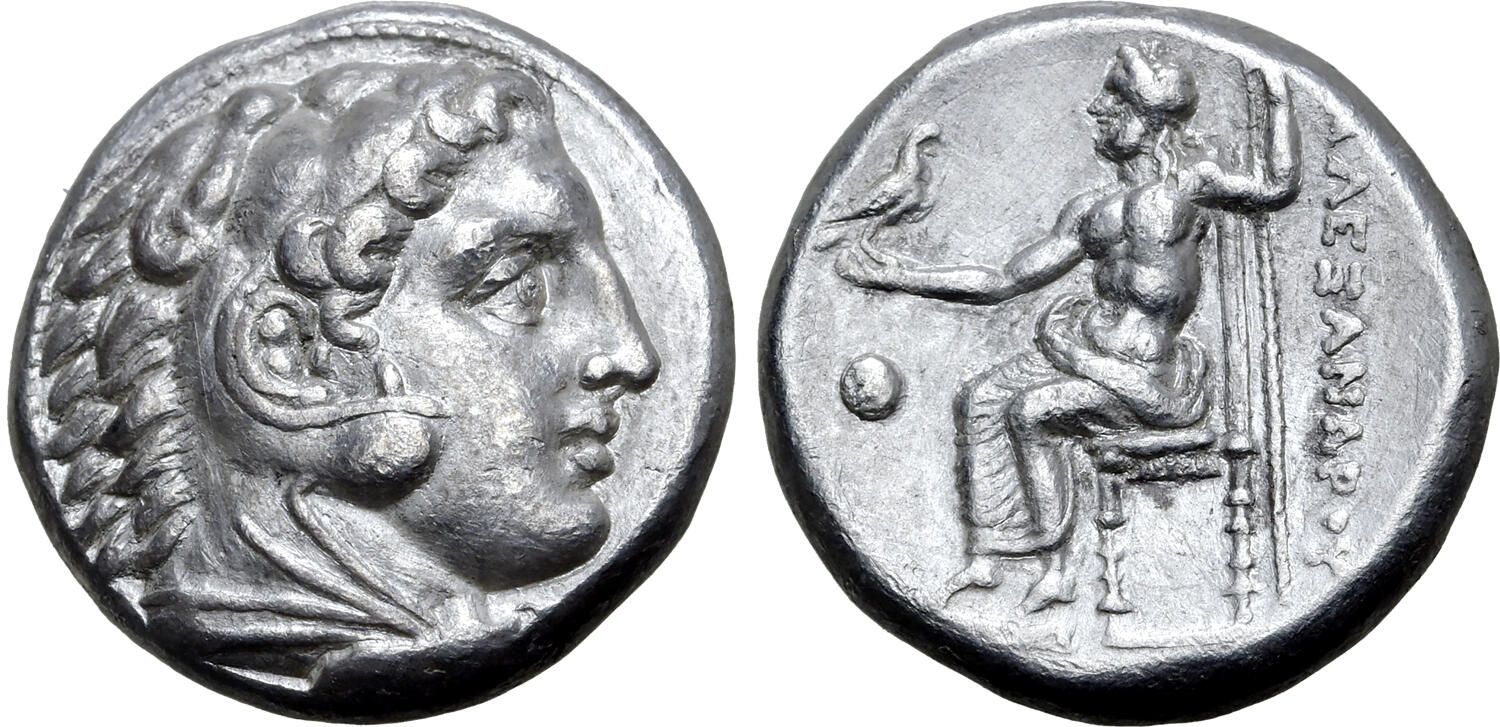319 BCE - 318 BCE | ΑΛΕΞΑΝΔΡΟΥ
Overstriking coin
Callatay 2021 1.png
Overstruck variety
Alexander the great tetradrachm.jpg
[1]
|
|
Sale(s)Sale(s) ᵖ:
|
Classical Numismatic Group, Mail Bid Sale 72, 14 June 2006, lot 399
|
|
|
|
Description
| ObverseInscription or printing placed on the obverse.:
|
Head of unbearded Herakles to right, wearing lion skin headdress, paws tied beneath chin. Border of dots.
|
ReverseInscription or printing placed on the reverse.:
|
ΑΛΕΞΑΝΔΡΟΥ (Greek) Zeus seated left on throne, right leg drawn back, his feet resting on a low footrest, holding long pearled scepter in his left hand and, in his right, eagle standing right with closed wings. In left field, Phoenician letters ‘ayin and kaph (initials for “of the king ’Ozmilk”), below or left: Phoenician date. Border of dots.
|
Mint and issuing power
| MintIdentifies the place of manufacture or issue of a numismatic object.:
|
Tyre
|
Ancient regionAncient region.
|
Phoenicia
|
Modern countryModern country: Lebanon
|
AuthorityIdentifies the issuing power. The authority can be "pretended" when the name or the portrait of X is on the coin but he/she was not the issuing power. It can also be "uncertain" when there is no mention of X on the coin but he/she was the issuing power according to the historical sources:
|
Alexander III the Great (Argead king, 336-323 BC)
|
Chronology
| FromIdentifies the initial date in a range assigned in a numismatic context. 319 BCE toIdentifies the final date in a range assigned in a numismatic context.. 318 BCE
|
Hellenistic 323-30 BC  periodTime period of the numismatic object. periodTime period of the numismatic object.
|
Physical description
MetalThe physical material (usually metal) from which an object is made.: Silver 
|
WeightWeight of the numismatic object (in grams). in grams: 17.0917.09 g <br />17,090 mg <br />
|
DenominationTerm indicating the value of a numismatic object. Examples: tetradrachm, chalkous, denarius.: tetradrachm 
|
AxisDescribes the directional relationship between the obverse and reverse of a numismatic object.: 11 mm <br />0.1 cm <br />
|
|
|
StandardStandard.: Attic
|
References
Description
| ObverseInscription or printing placed on the obverse.:
|
Head of unbearded Herakles to right, wearing lion skin headdress, paws tied beneath chin.
|
ReverseInscription or printing placed on the reverse.:
|
ΑΛΕΞΑΝΔΡΟΥ (Greek) Zeus seated left on throne, right leg drawn back, his feet resting on a low footrest, holding long pearled scepter in his left hand and, in his right, eagle standing right with closed wings.
|
Mint and issuing power
Chronology
| FromIdentifies the initial date in a range assigned in a numismatic context. 332 BCE toIdentifies the final date in a range assigned in a numismatic context.. 318 BCE
|
Hellenistic 323-30 BC  periodTime period of the numismatic object. periodTime period of the numismatic object.
|
Physical description
| DenominationTerm indicating the value of a numismatic object. Examples: tetradrachm, chalkous, denarius. ᵖ:
|
tetradrachm 
|
StandardStandard. ᵖ:
|
Attic
|
References
References
- ^ Price, Martin Jessop (1991), The Coinage in the Name of Alexander the Great and Philip Arrhidaeus: a British Museum Catalogue, 2 vol., Zürich-London, 637 p., 637 p., clix pl.
- ^ Newell, Edward T. (1916), The dated Alexander coinage of Sidon and Ake, Yale University Press, New Haven, 72 p.


